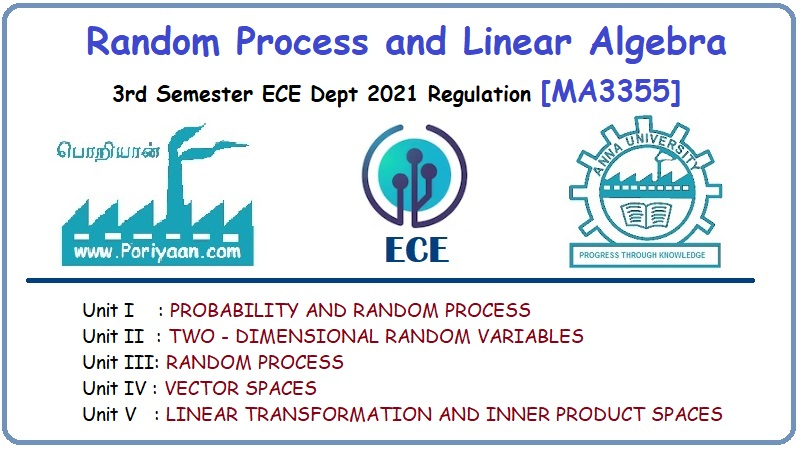Random Process and Linear Algebra: Unit III: Random Processes,,
Introduction of Random Processes
Definition, Examples
A random process is conceptually an extension of a random variable. A random variable is a function of time is called a random process. New problems in various branches of Engineering and Science, do not fit into the frame work of the classical probability theory. Such problems arouses us to study the processes, that is, phenomena that takes place in time. It is necessary to develop random processes which is a family of random variables that is indexed by a parameter such as time.
RANDOM
PROCESSES
Introduction
A random process is
conceptually an extension of a random variable.
A random variable is a
function of time is called a random process.
New problems in various
branches of Engineering and Science, do not fit into the frame work of the
classical probability theory. Such problems arouses us to study the processes,
that is, phenomena that takes place in time. It is necessary to develop random
processes which is a family of random variables that is indexed by a parameter
such as time. Many problems that arise in Physics, Chemistry and other fields
can be solved by using random processes. In this unit, we give a simple
solution to the mathematical problems which use random processes technique.
A comparison of Random
variable and random process.

DEFINITION
AND EXAMPLES
(a)
Random process
A random process is a
collection (or ensemble) of random variables {X(s, t)} that are functions of a
real variable, namely time 't' where s ε S (Sample space) and t ε T (parameter
set or index set)
Examples:
1. The daily stock
price.
2. The wireless signal
received by a cell phone over time.
3. The image intensity
over 1 c.m2 regions.
State space
The set of possible
values of any individual member of the random process is called state space.
Any individual member
itself is called a sample function or a realisation of the processes.
Note
(i) If 's' and 't' are
fixed, {X(s, t)} is a number,
(ii) If 't is fixed,
{X(s, t)} is a random variable.
(iii) If 's' is fixed.
{X(s, t)} is a single time function.
(iv) If 's' and ' are
variables, {X(s, t)} is a collection of random variables that are time
functions.
Notation:
As the dependence of a random process on 's' is obvious, 's' will be omitted in
the notation of a random process. If the parameter set 'T' is discrete, the
random process will be noted by {X(n)} or Xn. If the parameter set 'T' is
continuous, the process will be denoted by {X(t)}.
(b)
Classification of process [A.U CBT Dec. 2009]
[A.U A/M 2019 (R13) RP]
It is convenient to classify random processes according to the characteristics of t and the random variable X = X(t) at time t. We shall consider only four cases based on t and X having values in the ranges -∞ < t < ∞ and - ∞ < x < ∞
1. Continuous random
process
2. Continuous random
sequence
3. Discrete random
process
4. Discrete random
sequence

We can classify random
process in another way also. It can be classified as
1. Deterministic random
process
2. Non-deterministic
random process

(c) Statistical
(Ensemble) Averages
(i) Mean = E [X (t)] = 
(ii) Auto correlation
function of [X (t)]


(iii) Auto covariance
of [X (t)]

(iv) Correlation
coefficient of [X (t)]

(v) Cross correlation

(vi) Cross covariance

(vii) Cross correlation
coefficient

Example 3.1.1.
Define a random
process. Explain the classification of random process. Give an example to each
case. [A.U. N/D 2003]
Solution
:
It is convenient to classify random processes according to the characteristics of t and the random variable X = X(t) at time t. We shall consider only four cases based on t and X having values in the ranges -∞ < t < ∞ and - ∞ < x < ∞
1. Continuous random process
2. Continuous random sequence
3. Discrete random process
4. Discrete random sequence

EXERCISE 3.1
1. What is the
difference between an R.V and a random process?
2. What is the
difference between random sequence and random processes?
3. What is a discrete
random sequence? Give an example.
4. What is a continuous
random sequence? Give an example.
5. What is a continuous
random process? Give an example.
6. What do you mean by
the mean and variance of a random process?
Random Process and Linear Algebra: Unit III: Random Processes,, : Tag: : Definition, Examples - Introduction of Random Processes
Related Topics
Related Subjects
Random Process and Linear Algebra
MA3355 - M3 - 3rd Semester - ECE Dept - 2021 Regulation | 3rd Semester ECE Dept 2021 Regulation
